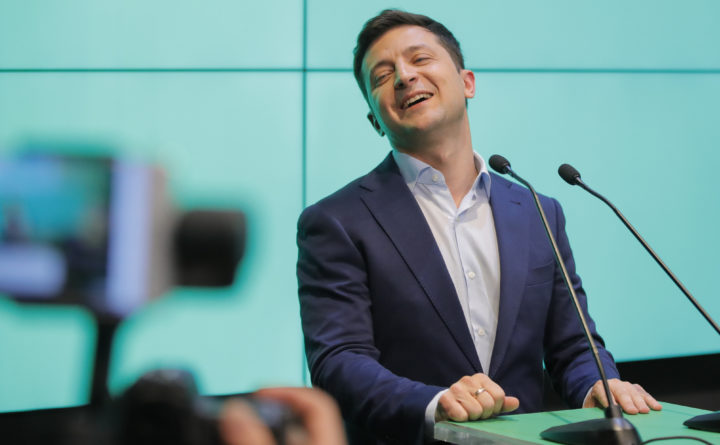
Ukraine has a new president, and he’s a comedian! Oh, wait a minute, that’s not such a big deal. Guatemala was the first country to elect a comedian as president: Jimmy Morales, back in 2015. Although Morales turned sort of serious once he took office: he’s a right-wing nationalist who supports the death penalty and opposes abortion. Whereas Volodymyr Zelensky hasn’t turned.
Right through the presidential election campaign in Ukraine, Zelensky avoided speeches. Mostly he just toured the country with a comedy troupe, performed in skits and did stand-up. And he’s not just a comedian, he’s a Jewish comedian, the very best kind. His style is south Ukrainian, sort of vaudeville, with a distinctive Jewish inflection, and people love it.
Congratulations to Ukraine, by the way, for having Jews as both president and prime minister (Volodymyr Groysman) at the same time, in the heart of traditionally anti-Semitic Eastern Europe, and not even making a fuss about it. But what is Zelensky going to do for Ukraine now that he has been swept into office with a landslide majority (73 percent)? Nobody actually knows, and this may include Zelensky himself.
When Zelensky did offer more than jokes, in the short videos he released from time to time during the campaign, it still wasn’t policies. More like mood music, really.
He’s from a family of Jewish Soviet intellectuals from a Russian-speaking industrial region [in eastern Ukraine],” Vyacheslav Likhachev of the National Minorities’ Rights Monitoring Group in Kyiv told the Haaretz newspaper. “He has repeatedly made fun of over-the-top [Ukrainian] national patriotic discourse.”
That will be a welcome change after five years of the pompous nationalist bilge of billionaire Petro Poroshenko, who won the presidency in 2014 after a popular revolt overthrew the pro-Russian stooge Viktor Yanukovych.
In a video Poroshenko released just before the sole presidential debate in Kiev’s huge Olympic Stadium last Friday, he tried to play the patriotic card: “There’s no room for jokes here. Being a president and supreme commander is not a game … it means being responsible for the people, for the country.” It would have sounded more persuasive if Poroshenko had done something about the corruption that has made oligarchs like him rich.
Zelensky’s response was lethal: “I’m not your opponent. I’m a verdict on you. I am the result of your mistakes.” And by a majority of almost 3 to 1, Ukrainians voted to put their future in his hands. Although, to be frank, most of them doubt that he can really deliver the future of peace and prosperity that they hope for.
The only evidence they have of Zelensky’s industry, honesty and wisdom is the television series he writes and stars in, “Servant of the People.” It’s a heart-warming story of a humble high school history teacher whose rant about the dreadful state of the country is secretly recorded by his students, and goes viral when they upload it to YouTube. So he is elected president of Ukraine.
Zelensky is not a high school teacher; he is a show-business millionaire with his own production company. He may be just as warm and sincere in person as Vasyl Petrovych Holoborodko, the former teacher and accidental president he plays in Servant.” (It’s one of Ukraine’s most popular series, and is now nearing 50 episodes.) Or he may not be.
Ukrainian voters are not fools. They know they are buying a pig in a poke. But they calculate that things MIGHT change if Zelensky becomes president, whereas they certainly wouldn’t change if any of the usual suspects won the presidency. And things are certainly not good now.
Ukraine has become the poorest country in Europe — far poorer than Russia. Millions of Ukrainians have left the country seeking work in Poland or Russia, and the low-intensity war against the Russian-backed separatists in the east drags on endlessly. No post-Soviet leader of Ukraine has made even a dent in the corrupt rule of the oligarchs. Indeed, most of them have been oligarchs themselves.
So why not vote for Zelensky? Most Ukrainians feel that they have nothing left to lose.
Gwynne Dyer’s new book is “Growing Pains: The Future of Democracy (and Work).”
This article originally appeared on www.bangordailynews.com.







